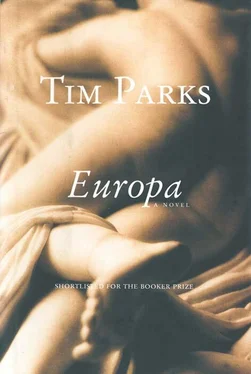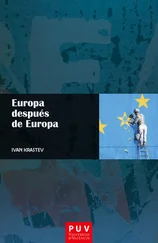Then, since it seemed at the time to be the only way to maintain any seriousness at all, any sacredness at all, I hit her. That was the second time. All your life, I reflect, you tell yourself you are a pacifist, you tell yourself you will never hit anyone, you never have hit anyone, you can’t imagine yourself hitting anyone. And then you do. When she said nothing had happened. You hit her, hard. But immediately you regret it. Immediately you tell yourself that you will never hit anyone again . And you feel this vow is stronger now. Because of the experience of the first time. Forewarned is forearmed, you tell yourself. I will never hit anyone again, you tell yourself. But then you do do it again. You find The Age of the Courtesan with that triumphant dedication, not even hidden, barely remembered, and you hit her again. I hit her across the face, very hard, I who never hit anybody, not even as a boy, and she cried and said, Again, hit me again, if it will get it out of your system. And I did hit her again, even harder, two or three times, across the cheeks and face, and I was appalled and begged forgiveness and hit her again and we made love, until she found she couldn't move her jaw properly, it clicked when she opened and closed her mouth, and I took her to the casualty ward at the hospital where we invented some story which they clearly didn’t believe about her catching her chin on one of those fold-up garage doors, and even while they were shaking their heads in disbelief, all I could think, repeating it over and over to myself, was that she was not the person you imagined her to be. I had fallen in love with someone and she had turned out to be someone else. And already Í was someone else. And even though that night was spent together and there was no suggestion that we were breaking up or that it was all over, still I understood now that everything was impossible, everything was past.
Dead Poets Society has reached its climax. Robin Williams has been fired by the reactionary school authorities who do not realize what a splendid life-force, despite the suicide, our million-dollar actor is. Robin agrees to go, with a certain nobility, with the wisdom of he who accepts the inevitable having carped his diem — the wisdom, in short, that I lack. But the boys in his class are challenged to show their solidarity, to show that their relationship with their teacher was a real one, of trust and complicity and mutual respect. And to do this, one by one and very bravely, they climb on top of their desks, a gesture of wilfully making oneself visible and vulnerable, for of course they have been forbidden to do so by some conservative schoolmaster eager to tidy away the whole unfortunate affair and get back to some serious teaching. The boys climb on top of their desks because they feel the need to show their love and support and affection for Robin and to show above all that the past was worth something , even if the future must now be different.
On six video screens speeding across a soon-to-be^united Europe a dozen American college boys stand up on their chairs and then on their desks, and I can see, sitting here on the third seat from the back, how this wonderfully kitsch scene, where we all enjoy feeling that we are on the right side and revelling in our sentiments, is actually drawing tears from many an eye in our group, and not least, amazingly, from the expensive, soft-contact-lensed eyes of Doris Rohr, whose own lessons one imagines must be the last word in the dusty formality of the day unseized, since teaching, for Doris, is merely a necessary and unfortunate corollary of having a position. Yes, a fat tear is rolling down through heavy powder on Doris’s cheek. She is weeping for Robin, as others once for Hecuba, and at this point I too get up from my seat. I can’t stand it any more.
I get up from my seat. But without standing on it. The coach is charging down those long curves that- lead away from the Alps. Swaying up from the red upholstery, I stumble a moment, for someone has left a bag in the passageway. Head down! a voice shouts, in Italian, We can’t see! I start to lurch forward up the carpeted passage, which has small rubber squares every pace or so. The light from outside comes in in chinks and slashes, since the curtains are drawn on the video, a muddled, fluid, mobile light. There’s the throb of the road beneath my feet and sudden gleams of reflected daylight glancing over the seat backs.
I draw level with her , level with her seat, where, as expected, she is utterly engrossed in watching how even the last and weakest of the boys has the courage to climb on his rickety desk and declare his sniffling allegiance to his crazy non-conformist schoolmaster, who, intercut with the brave boys, is beaming with poignancy, his pointed nose red with emotion. And she too is beaming. Her face, which always had a friendly, nibbly rabbitiness about it, is smoothed out and as if polished by the soft-hued light playing over her cheeks, and her eyes like Doris’s are shiny with the pleasures of vicarious emotion, I’m barely a foot away.
Then standing here, swaying in the passageway as this multi-facility air-conditioned coach abruptly changes lanes to overtake something slow, I experience an overwhelming sense of incongruity and inconsequentiality, of the unlikeliness and unloveliness of everything, both within my head and without. Here, only inches away, I tell myself, is the woman who more than any other gave you the illusion of love, who made you believe, no, who systematically undertook to make you believe, that you had taken a wrong turning in life, as she put it — your marriage — and that all you need do to feel whole and happy again was to take matters into your own hands, reverse that decision: Be yourself , I remember her saying; as she was also capable of saying such things as honesty is the best policy and make love not war , and even, on our return that night from the hospital, despite a heavily bandaged jaw, that there was no point in crying over spilt milk , an expression which exists, remarkably enough, not only in English, but in Italian and French as well, and even, I believe, in Georges German, and is equally ridiculous in all of these languages, since what would one ever cry over, I demanded of her then, what would one cry over if not spilt milk? I wanted to hit her again for saying that. For the stupidity of saying that. Would you cry over milk if it hadn’t been spilt? No, it’s over spilt milk you cry, people have always cried. Nor does there need to be any point in it at all. Whoever suggested there need be any point in crying, I tell myself now. And sensing, with this sudden and atrocious awareness of incongruity, literally inches from this woman who fills my thoughts incessantly and to whom I have nothing to say, sensing that I am only seconds from that awful brink where I might try once again to drum some meaning into absurdity, to force a resolution that cannot be — with the back of my hand, I mean — I tear myself away to stumble forward almost to the front of the coach, where Vikram Griffiths is talking to the driver.
I stand by the front seat. There’s the huge curved windscreen, spattered with spray from the road, but gorgeously clear, clearer somehow than the air it pushes before it, or giving a greater illusion of clarity. And here, standing up front while we overtake a truck from Trieste carrying two great blocks of stone up to France in that constant sorting and resorting of things the race always seems to be involved in so that a million Chambersee Service Stations can be built all over the world and can all look exactly the same, I’m able to overhear Vikram wanting to know from the driver how much extra he would charge for taking us into central Strasbourg tonight and what’s the latest he’d be willing to pick us up on the way back, because having come all this way, Vikram laughs, appealing to that old male solidarity, we’re eager to see a bit of action, aren’t we, and if…
Читать дальше












